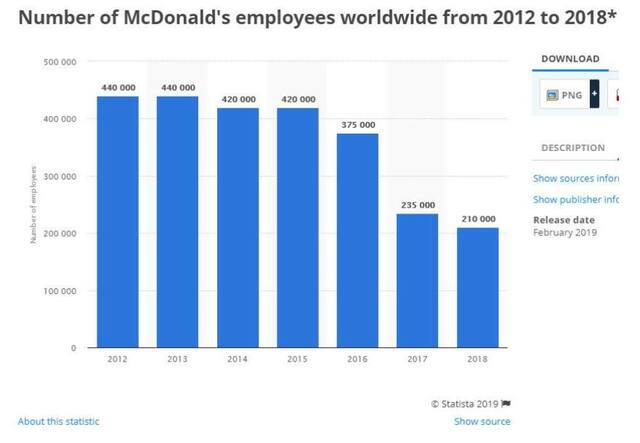|
By Ryan Tibbens for educational purposes only
~~ If you do nothing else with this article, watch the Andrew Yang/Joe Rogan video clip linked below. Automation is going to change the world. ~~ I'll begin by saying that I support the minimum wage as an imperfect though well-intended and mostly functional concept. Some even suggest a currency-adjusted, global minimum wage, which has become a point of contention between some economists. (Now that the less-open-minded libertarians among us have bailed, we can proceed thoughtfully.) More and more large corporations are announcing their support for a $12 or even $15 minimum wage, and it should come as no surprise. These businesses include Amazon, Disney, Target, Walmart, and now McDonald's. We shouldn't be surprised because big businesses will always do what is best for themselves and their shareholders: crush competition and generate profits. A corporation's sole purpose is to generate profits through channels that mitigate the financial loss and personal liability of shareholders. As such, these modern giants see the benefit of increasing the minimum wage -- they can afford it, and much of their remaining competition can't. Even if a wage hike doesn't make sense in the short term, allowing government to legislate their competition out of business is a winning strategy in the long term. And since each of these companies is intensifying dependence on automation, they will have fewer human employees to pay soon anyway. [Article continues below.]
A Friend recently shared this article about McDonald's abrupt shift to supporting a minimum wage increase. "By sticking together and taking action on the job, courageous workers in the Fight for $15 and a union have forced McDonald's – the second-biggest employer in the world – to drop its relentless opposition to higher pay," SEIU President Mary Kay Henry said in a statement. "Now, McDonald's needs to use its profits and power to give thousands of cooks and cashiers across the country a real shot at the middle class by raising pay to $15 an hour and respecting its workers' right to a union." My friend went on to point out that McDonald's has cut its workforce by nearly 50%, nearly 210,000 jobs, in the last four years.
Of course, we've all heard horror stories about fast food automation, from robot grill masters that work slower than the stoned 17 year olds they replaced to the poop-smeared touchscreen kiosks (or maybe not). But this is a primary reason McDonald's and other large companies are actually reducing employment. Will increasing the minimum wage really intensify automation? Many people certainly think so, particularly those who oppose the minimum wage in the first place.
So what is going to happen when McDonald's and Amazon and the rest strong-arm the federal government into increasing the minimum wage on their own terms? 1) Big companies can afford the increased wages, at least in the short term, so they gladly pay. 2) Smaller competition goes out of business trying to pay those wages. 3) Big companies receive the surplus business because they've outlasted competition. 4) They use the increased revenue to further invest in automation. 5) Nearly no one is left making $15/hour due to massive layoffs (thanks to automation), so the minimum wage doesn't really matter anymore. 6) We move to some form of universal basic income because, without it, no one will be able to buy food from McDonald's or random crap from Walmart and Amazon. 7) We all admire President Yang's forward thinking -- Andrew Yang for President 2020. 8) Karl Marx replaces Alexander Hamilton on the $10 bill. (Okay, maybe not this part...)
Seriously, watch the video.
2 Comments
Hey, I’m one of those ‘close-minded’ libertarians and I read the blog through to the end 😜. Paying people for more than they produce per hour is a bad business model. What we need is to imbue people with the skills to produce more value per hour. I’m sure our public schools are up to the challenge. Oh, wait.
Reply
Ryan Tibbens
6/14/2019 11:13:06 pm
But you've missed part of the point -- what happens when we don't have enough jobs for people because automation and AI reshape our workforce? Isn't the purpose of technology to improve our lives, to do some of our work for us? The average hunter-gatherer only worked about 20 hours per week; the average American today works over 44 hours. Granted, we live much safer, healthier, longer lives, but we haven't exactly let the technology go all the way in lightening our loads. If larger and larger portions of our economy will be automated, then we need to adjust. A 10-20 hour work week, UBI, and a change in what and how students learn in school will all be necessary. Automation can either turn the world into a real-life Hunger Games or a real-life permanent vacation.
Reply
Leave a Reply. |
Read.Think.Write.Speak.Because no one else Archives
December 2021
Categories
All
|






 RSS Feed
RSS Feed